Editor's Note: This story is part of The Partnership Project, a series of content written in an effort by The Daily News to follow the formal collaboration of Ball State University and Muncie Community Schools. Read more in this series here.
At the bottom of every email she sends, Rhonda Ward closes with a quote from Vice President Kamala Harris: “Our unity is our strength, and diversity is our power.”
As assistant principal of Muncie Central High School and Muncie Community Schools’ (MCS) newest director of diversity, Ward starts every day with the power of diversity pushing her forward and the goal to ensure equality and equity for all MCS community members.
RELATED: MCS hires new director of diversity
While Ward has only held the director of diversity title since June 2020, she said she has been working on her goals related to diversity and inclusion within MCS throughout her 21 years as a faculty member.
“The more I think about it, I thought, ‘Wow, the goals I’ve set for this role I’ve kind of been doing and had been prior to the role,’” Ward said, “which made it so nice when they did officially name me director of diversity.”
Entering education
Ward was born and raised in Muncie and found herself moving back after graduating from Tennessee State University with a bachelor’s degree in psychology. While education was not her initial plan, she said, working at Claypool Elementary School as an instructional assistant inspired her to follow a new path.
“From there is when I decided that I wanted to switch over to education,” Ward said. “I worked in a second-grade classroom and loved it. The principal at [Claypool] at the time is the one who encouraged me to go to Ball State and obtain my master’s in education, so that’s what I did.”
After receiving her master’s, Ward went on to complete the principal licensure program at Indiana Wesleyan University. Now, she holds two titles with MCS, sits behind two desks in two offices and works tirelessly in both positions to ensure equality and inclusion of all MCS members.
Taking on the role
Since MCS first introduced the job of director of diversity more than a decade ago, it has never stood as its own individual role, Ward said, and, for a while, no one occupied the position. It wasn’t until last year that MCS’ District Equity Team (DET) brought up the idea of filling the position once more.
“I had started working with a group of individuals within the corporation last year,” Ward said. “We started trying to figure out ways that we can improve our district when it comes to ensuring that all of our students and families and staff feel valued and respected.”
DiLynn Phelps, MCS’ former director of diversity, is a member of DET. When discussing the issues, Ward said, Phelps spoke up and mentioned the existence of the director of diversity role in the past.
“I did this role before,” Phelps said, “and we could use that role again.”
Ultimately, Ward said, DET continued the conversation of bringing the position back to MCS, and, after a few more meetings, settled on doing so.
“That’s kind of how [director of diversity] came into play,” Ward said. “The more we met, the concern came up that we need someone who can kind of be in charge and lead MCS in that way.”
After further discussion between DET members, it was clear the best person to fill that position was Ward.
“I am thrilled to be the director of diversity and serving in this role at this time,” Ward said. “I want to make sure that equality and equity are being fully enforced and emphasized.”
When Johanna Voss, MCS parent and mother of three Muncie Central High School students, read an article saying MCS was creating the director of diversity job and hiring Ward, she said, she was thrilled.
“I sent her an email at the time and said, ‘I can’t imagine a better person for this job,’” Voss said. “She’s just been excellent. She has engaged with the students and our children in just amazing ways.”
Carol Daugherty, Muncie Central High School’s two-dimensional art teacher, also said she believes the position is much needed and that Ward fits it well, particularly because of her ability to connect to MCS’ diverse student population on a deeper level.
“I know our students of color feel particularly more comfortable with Mrs. Ward than they do with some other adults in the building,” Daugherty said. “Just being able to relate to who they are and their culture is very helpful.”

Rhonda Ward's director of diversity name badge is pinned onto her suit jacket April 20, 2020, in her office, in the Muncie Community Schools Administration Offices building. Ward splits her time between the Administration Office and Muncie Central High School, where she is also the assistant principal. Jaden Whiteman, DN
Improving teacher diversity
As director of diversity, Ward said, she is responsible for overseeing the diversity and inclusion efforts of MCS and ensuring culturally responsive practices are consistent throughout the district. To achieve this, Ward has laid out specific goals for herself she hopes to accomplish in her position.
“I would say, for the past few years, I have noticed some areas that I felt like MCS could improve upon when it comes to supporting Black and brown students and even teachers and the staff,” Ward said.
One of these areas includes increasing minority representation when it comes to MCS teachers of color. Ward said MCS has 592 employees in their district. Of these employees, only 53 are minorities — 29 certified teachers and administrators and 24 secretaries and aid employees.
In an effort to increase these numbers, Ward said she has been coming up with strategies for recruiting teachers of color.
“One of the things that I have started doing is establishing partnerships and relationships with historically Black colleges and universities like Tennessee State University and Kentucky State University,” Ward said. “Another goal is continuing to provide implicit bias training and cultural competency training for our staff, our teachers, our resource officers, our bus drivers — anybody that’s considered a frontline worker in our district.”
Earlier this academic year, Ward partnered with Melinda Messineo, department chair of psychological science and professor of sociology at Ball State, to schedule implicit bias training sessions for MCS members in another effort to increase teacher diversity and inclusion.
"Rhonda Ward is deeply committed to doing everything it takes to build an inclusive community,” Messineo said via email. “Whether it is part of MCS or through her work as a member of the MLK Dream Team, Ms. Ward is a visionary in the area of diversity and inclusion."
In addition to the efforts she has made in relation to improving teacher diversity in MCS, Ward said, simply having a director of diversity has had an impact on the recruitment of more diverse faces.
“A lot of times, when people are looking for jobs, if they see that [an employer] has a director of diversity, they think, ‘Oh, these people are all about equity and inclusion, and that’s where my heart and passion lie, so I’m going to go there,’” Ward said. “I’m hoping that’s what people see — that there’s someone who will take charge and that they will not only have a voice, but they will be heard.”
Minority Educator Council
To ensure minority MCS teachers and faculty feel heard, Ward established the Minority Educator Council (MEC), which she described as a support group for all teachers of color within MCS.
“This idea came to me back in the fall,” Ward said. “I thought, ‘What can I do to make sure teachers of color feel supported since there are so few of us? What can I do to help with this initiative?’”
Her main goal in establishing MEC, Ward said, is for these teachers to serve as a means of support for one another, not just in relation to MCS, but in the inclusion and recruitment of more people like them. MEC serves as a resource where teachers of color can encourage one another, collaborate and bring more ideas and suggestions for increasing MCS teacher diversity.
“When I first met with the group, I told them, ‘I want this to be our happy place,’” Ward said. “This is to bring encouragement and some positive light to the role that we have within the district.”
After the first meeting, Ward said, she was filled with positivity and excitement. There was something about meeting with MEC for the first time that made her feel accomplished as director of diversity.
“It was the greatest feeling in the world,” Ward said. “To see the smiles on people's faces, the nods and the comments that were made was incredible. We were all feeding off of each other, and the ideas were just coming out. It was the best feeling for me to find out this can really go somewhere and be very positive for the minority group of teachers, and that’s what I wanted it to do.”
While MEC serves as a networking tool for the district to help retain and recruit more minority teachers, Ward said MEC is also used to empower minority students. She said she hopes seeing the faces of diverse teachers working together and succeeding inspires these students to work hard to achieve similar goals.
“I want these students to feel like they have an opportunity to maximize their potential while they are a student,” she said. “I want [these teachers] to serve as mentors for our students.”
Since its foundation, MEC has developed and brought to fruition multiple ideas, including a Black History Month decorating contest, which started this year and will continue as an annual event.
“I was talking to the group, and I said, ‘What can we do that’s really unique or special for Black History Month?’” Ward said. “The idea came out of the group to have a Black History Month decorating contest.”
MEC decided to make it a contest at every level and in every MCS school. Teachers across MCS were encouraged to include their students in the process of decorating their classroom doors, walls or bulletin boards with something related to Black History Month.
“Oh my gosh, we had so much fun with that event,” Ward said. “It brought a lot of joy to a lot of people — teachers and students. A lot of teachers all across the district participated and got so much joy in doing it. The students were so excited about it. A lot of them helped their classroom teachers. It was so cool.”
Decorations and information varied from school to school, Ward said, but some of her favorites highlighted Amanda Gorman, the Black Lives Matter movement and famous Black tennis players.
“They were phenomenal, oh my goodness,” Ward said. “Kids were excited about it, principals were excited about it. That was one way that our whole district was able to come together, and that’s what I really liked about it.”
While MEC is still relatively new to MCS, Ward said she has big hopes for its future and the ideas that will come out of further collaboration with MEC members.
“We are just getting started,” Ward said. “I’m really excited about the group. I’m hoping that MEC is something that will grow and it will remain in the years to come. That’s my hope, and my goal and my prayer for MEC.”
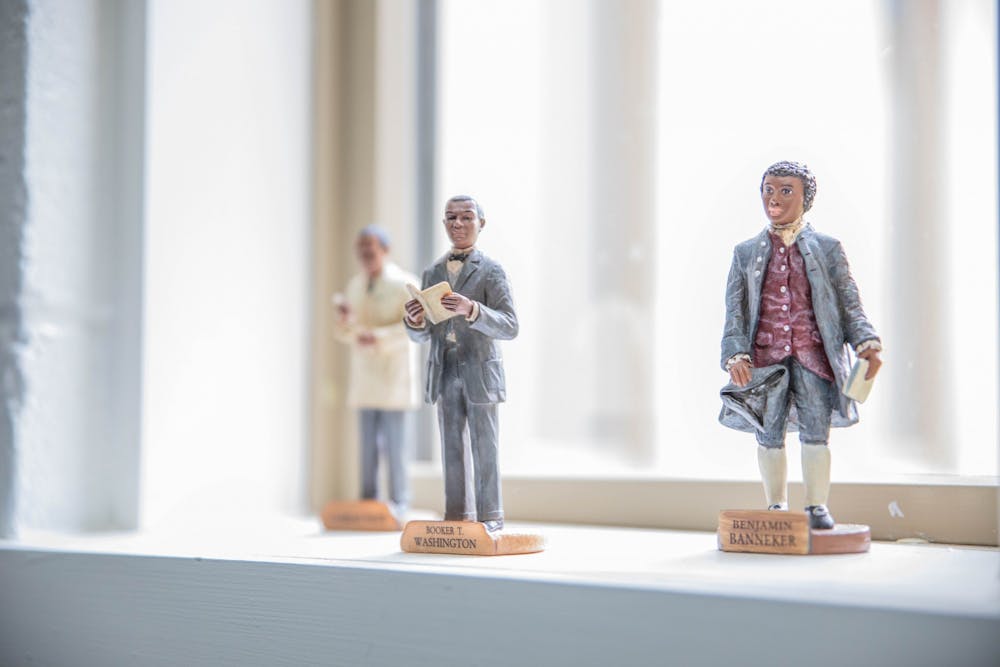
Historical figurines sit on Rhonda Ward's office windowsill April 20, 2020, in Ward's office, in the Muncie Community Schools Administration Offices building. Ward also has figurines of Matthew Henson, Bessie Smith and James Beckwourth. Jaden Whiteman, DN
School Equity Teams
In addition to MEC, Ward also decided to bring back MCS School Equity Teams (SET), a concept first introduced by Phelps when she held the role from 2009-16. Each MCS school has a SET composed of teachers and counselors that meets once a month at staff meetings to discuss issues of inclusion and diversity.
Daugherty said she has taken on the role of Muncie Central High School’s unofficial SET chairperson. She said she is thankful for what these monthly meetings have taught her about improving inclusion efforts in her classroom.
“Taking time particularly to think about, ‘Hey, what’s this experience like for your students of color, and how can we relate to their experiences, which might be different from ours?’ helps to raise awareness of the issues that we encounter every day,” Daugherty said. “It’s to help the teachers have a point in time monthly where we just give a little time and thought to some of the issues that are experienced, particularly by our African American students, who are a large amount of our school.”
During each SET meeting, Ward said, members participate in what they call “Take 10 Articles.” Every month, teachers and counselors are given an article describing and discussing some kind of diversity-related issue, Ward said, and answer the questions that go along with the content.
“Teachers are really able to reflect and converse with others, sharing their thoughts, and their ideas and their opinions,” Ward said. “That’s some good dialogue that takes place at the staff meeting once a month.”
Student improvements and efforts
Ward’s work regarding diversity efforts extends beyond just MCS teachers and faculty. Another goal of hers is to make sure MCS students feel welcome, included and comfortable in their classrooms.
To do this, Ward said, one of her hopes is to implement a curriculum that has culturally relevant material in each classroom, providing “a variety of texts that include positive, diverse characters.”
When it came to choosing where to send her three children to school, Voss said, this was an important aspect they searched for in every school environment.
“We were really wanting to be in a school district that valued diversity, and inclusion and equity,” Voss said. “I think it has the potential to create an environment in the school that we feel like is an incredible benefit to all students, not just students who would be considered a minority student, and that’s the kind of environment that we want our students to be a part of.”
A second goal Ward is working on for the benefit of MCS students involves efforts to decrease the number of suspensions of Black and brown students. One way she hopes to achieve this is through the continued implementation of MCS’ restorative justice practices, specifically focusing on the high school level.
A final effort Ward detailed involves addressing the practices put in place to provide students of color equitable access to the gifted and talented programs, advanced placement courses and dual-credit opportunities. A major factor in students’ placement into these programs is standardized testing scores,Ward said, and minority students typically score low.
“A lot of times, that's one of the indicators of students being placed in the advanced placement courses and programs,” Ward said. “We’re trying to put a focus on that to see what other criteria we can come up with so that it’s equitable for Black and brown students.”
Ward said the role of director of diversity has also opened doors for her in terms of providing more opportunities for minority students regarding educational programs and financial aid, including some summer programs and scholarships.
“I am constantly recruiting students from all levels to get involved and participate,” Ward said. “I know they will benefit from a lot of these programs and scholarships that I’ve been able to pass on to them and share with them and their families.”
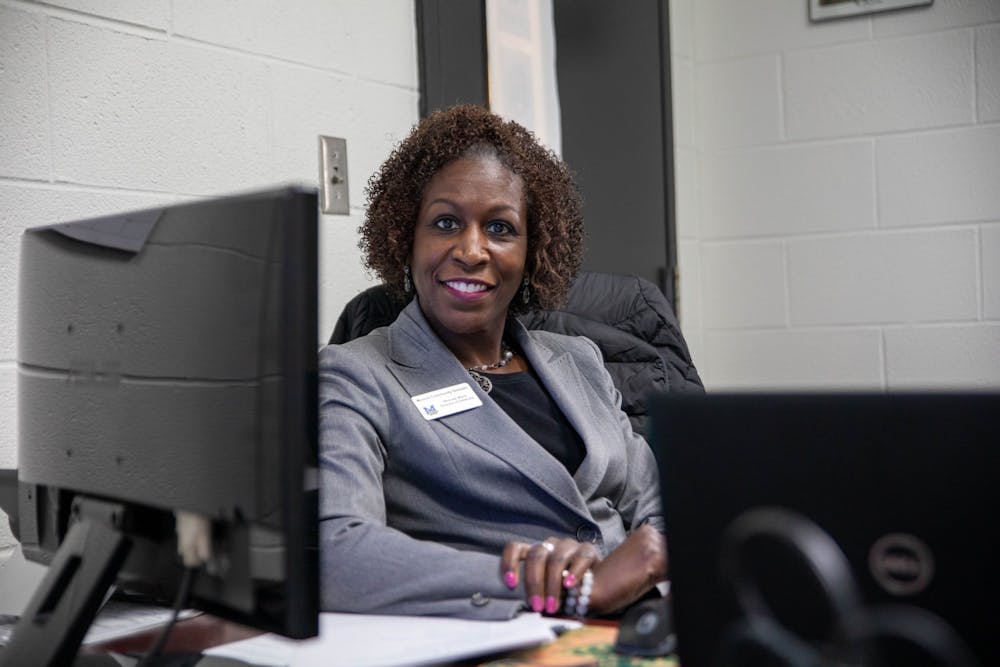
Rhonda Ward, director of diversity at Muncie Community Schools, poses for a photo in her office April 20, 2021, in the Muncie Community Schools Administration Offices building. Ward has been the director of diversity at MCS since June 2020. Jaden Whiteman, DN
A representative face
While Ward works diligently on all of her goals behind the scenes, she said, she hopes she can serve as a reminder of the continued efforts of MCS to ensure equality and diversity in the community.
To her, Ward said, being director of diversity means ensuring equality and equity are present between all members of the MCS community, not just MCS leaders.
Ward said one of her hopes is MCS community members know there is a place for them to go where their concerns will not only be heard and listened to, but acted upon and, hopefully, improved.
“People see someone in charge and see that I’m actually taking a stand in being here for anyone that may need someone to speak to them, someone to hear them,” Ward said. “I think that, by having a director of diversity, I hope the community will think, ‘Oh, they’re really serious about this, and they’re truly committed to it because they’ve got someone leading the charge.”
Ward said one of the most important things about being director of diversity is being able to listen. She wants to be the person MCS community members can go to to speak about a concern they have and promise action will be taken to make sure MCS members feel appreciated and respected.
“You have to do more than listen,” Ward said. “You have to take a stand, and address it and get to the bottom of things so that everyone can improve and be better. The overall goal is that everyone feels respected, everyone feels safe and everyone feels welcomed. I think that’s huge and important, especially in this day in time that we’re living in.”
Learning while leading
For the MCS community, Daugherty said, Ward stands as a leader for what it means to work toward improving inclusion and promoting diversity, but Ward said she is continuing to learn herself.
For Ward, she said, becoming director of diversity has been an eye-opening experience. She has learned about the various opinions and biases different people hold and how, sometimes, it can be difficult to shove those aside, but it is necessary to do so in order to achieve what she has set out to do.
“It’s taught me that we have to have an open mind, and, sometimes, our biases have to go out the window, so to speak, when you’re dealing with people, and you want everyone to feel included,” Ward said. “People will respect you more when they know that you will listen to them.”
While Ward has only been director of diversity for just short of a year, Voss said she has seen Ward’s efforts go beyond this position, as she consistently works with students and the MCS community to improve the environment they are all a part of.
“I just love the fact that, even as the years have gone by, we’ve just seen this continued commitment to these things,” Voss said. “[The fact] that she is the person in that role has been really wonderful.”
Ward may be the only director of diversity at MCS, but Daugherty said the job goes beyond the work of just one person. Ward stands as a leader for the rest of the MCS community, Daugherty said, and continues to guide them in the right direction regarding diversity and inclusion.
“If Rhonda can be a leader in helping filter down to the rest of the leaders in the school so that we have a better understanding on how to best help all of our students,” Daugherty said, “then [teachers] can make changes and stand up for equity within the walls of our room. I think that’s the ultimate goal.”
Ward is proud of the work she has accomplished so far, she said, but she realizes change will not happen overnight. She hopes, as she advances in her role, she can still serve as a reminder of the continued efforts being made at MCS to improve diversity.
“It has taught me that we have a long way to go in terms of respect and biases,” Ward said. “Everyone’s a work in progress. Everyone wants to feel valued, and everyone wants their voice to be heard, and I feel like we must [continue working] in order to learn and grow.”
Contact Taylor Smith with comments at tnsmith6@bsu.edu or on Twitter @taynsmithh.

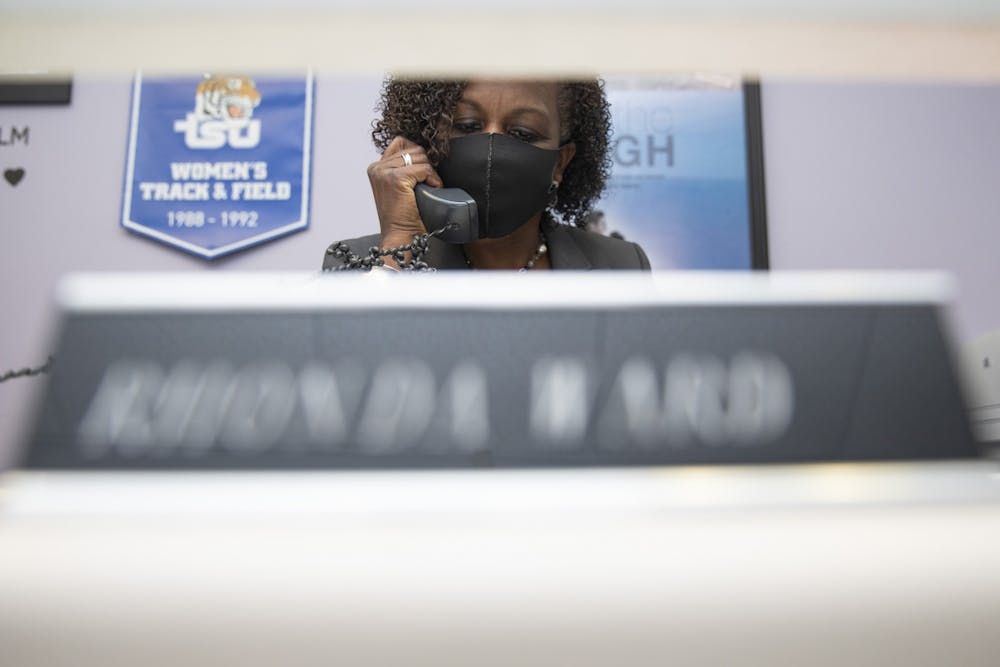
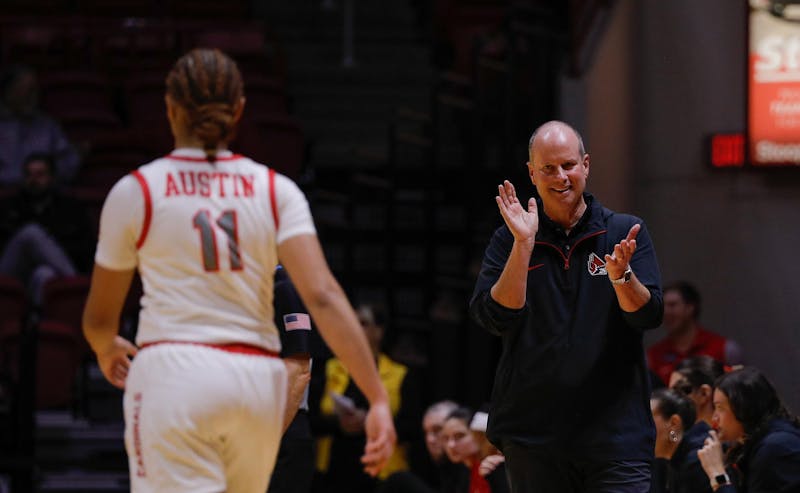
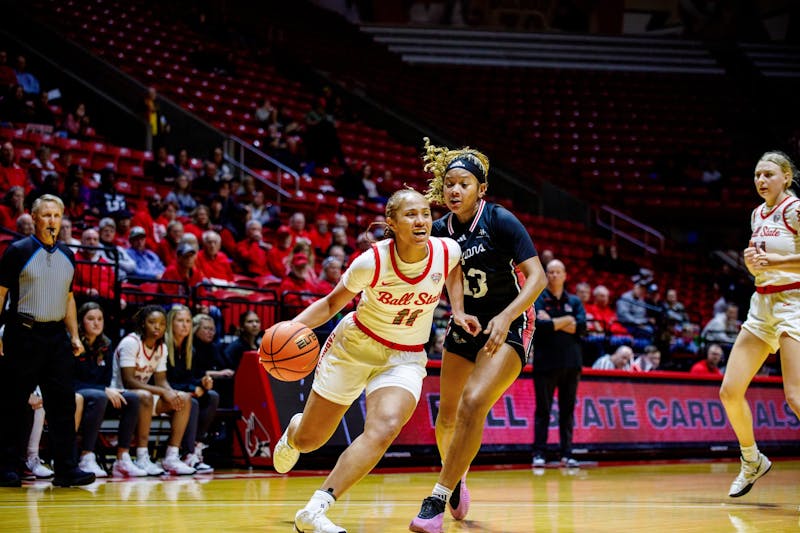
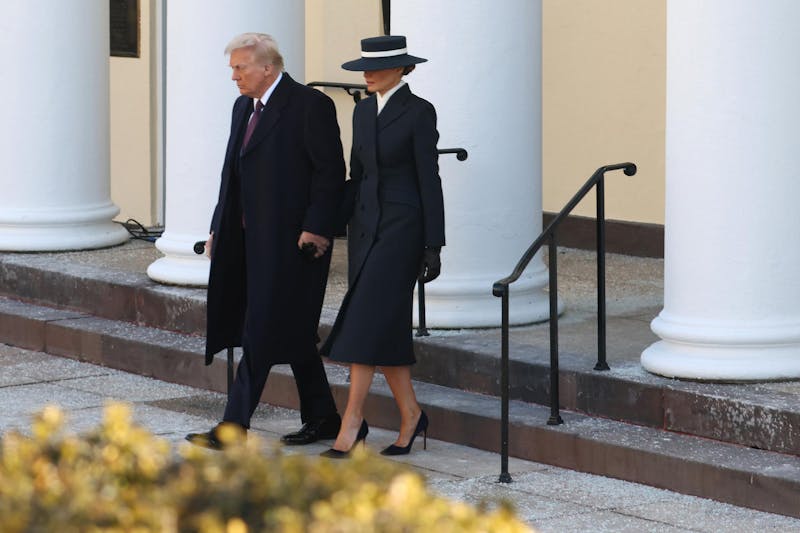
The Daily News welcomes thoughtful discussion on all of our stories, but please keep comments civil and on-topic. Read our full guidelines here.